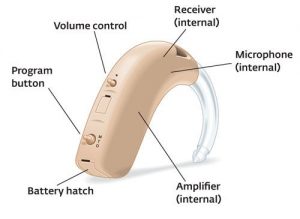Want to buy a hearing aid? Want to know the difference between hearing aids? Yes, you came to the right place. If we see from the manufacturing standpoint, the answer will be ‘yes’. This is because every hearing aid consists of a microphone, amplifier, receiver, and battery. But if you compare the functioning and working of all hearing aid machines, the answer will be ‘no’. All the hearing aids are different in usage, technology, quality, and price. Hearing Aid have their own purpose. As we know there are 3 kinds of hearing loss –
You can purchase the latest hearing aids at a fair price through HearingSol, If you need more information or you have a query about Hearing Aid or Hearing Loss, just give us a call on +91-9327901950. We are always here to help you.
In every hearing loss, a particular type of hearing aid is used.
Components of Hearing Aids

Microphone: It receives the sounds waves from the air and converts them into electrical signals. There are two types of microphones:
Directional: Directional microphones receives the signal from the person standing in front of the person who is wearing them.
Omnidirectional: Omnidirectional microphones receives the signal from all the directions.
Nowadays, most of the hearing aids came up with both mics features i.e. directional and omnidirectional.
Amplifier: The signal received from the microphone goes to the amplifier which increases the power of a signal.
Receiver: It converts the digital signal into vibration. This passes through the inner ear to the brain. Some of the hearing aids are directly set into a particular position in the ear canal, while some others set nearby a small tube by which it connects and inserted into the ear.
Battery: Battery provides the power to the hearing machine.
Different Hearing Aids and their Uses
There are different styles of hearing aids-
Canal Hearing Aids
They fit inside your ear and are harder to see. Four types of canal hearing aids are- In-the-canal (ITC), Completely-in-canal (CIC), Invisible-in-Canal (IIC) and Behind the Ear (BTE). They can help in mild to moderately severe hearing loss. This type of hearing aid isn’t ideal for children or adults who might have problems with very small devices
In-the-ear (ITE)
It fits completely inside your outer ear. Best for people with mild to severe hearing loss. They don’t work for the children whose ears are still growing. They came with multiple sizes and strengths but can be seen by another person from the ear side.
In-the-canal (ITC)
ITC aids smaller in size and less visibility as compare to ITE as they fit right into your ear canal.
Completely in the canal (CIC)
CIC hearing aids fit into your ear canal a little bit far way than ITC hearing aids. Their visibility very less unless someone looks up directly into your ear. They have features of hearing loop setting because they are tiny in size.
Invisible in the canal (IIC)
These are installed at last of the ear canal. They are installed and removed by the only audiologist, who maintains the hygiene.
Behind-the-ear (BTE)
It is covered in a hard plastic case behind the ear. It fits inside the outer ear and directs the sound coming from outside to the ear. A Mini BTE fits entirely behind the ear. And its narrow tube goes into the ear canal. This helps in building up of earwax and ensures that your own voice sounds clear. Anyone can use BTE hearing aids regardless of age and amount of hearing loss.
A tiny loudspeaker held in the ear by a soft tip which is connected via a wire which runs through the hearing aid. Multiple terms use for this type of aid such as a receiver in the ear, a receiver in the canal, and loudspeaker in the ear. They are not suitable for all hearing losses.
Before you buy
When you searching for hearing aids, explore your option to understand what kind of hearing aids will work best for you according to your problem or loss.
- Do a hearing assessment: Check out the exact reason for hearing loss with your doctors such as earwax, any infection or any loss occur has been testing by an expert hearing specialist (audiologist)
- Find a referral for a reputable audiologist: If you don’t know a good audiologist then ask your doctor for a referral. An audiologist will access your hearing and help you to choose the best suitable hearing aid and adjust the device to meet your needs. You can get the best results with two hearing aids.
- Ask about the trial period: You can usually get a hearing aid with a hearing period. It may take some time for you to use the device and decide whether it is right for you or not. The dispenser has been asked to write the cost of the trial, whether the amount has been deposited for the final cost of hearing aid, and if you return, then how much refundable
- Check for warranty: Ensure that hearing aid includes a warranty that covers parts and labor for a specified period. Some offices may include office travel or professional services on the warranty.
- Beware of misleading claims: The hearing aid cannot restore normal hearing or eliminate all background noise. Be careful of ads or dispensers otherwise claiming.
- Plan for expenses: Cost of hearing aids is quite different. Commercial charges, remote control, hearing aid accessories, and other hearing aid options may cost extra. Talk to your audiologist about your needs and expectations.
You can purchase the latest hearing aids at a fair price through HearingSol, If you need more information or you have a query about Hearing Aid or Hearing Loss, just give us a call on +91-9327901950. We are always here to help you.
